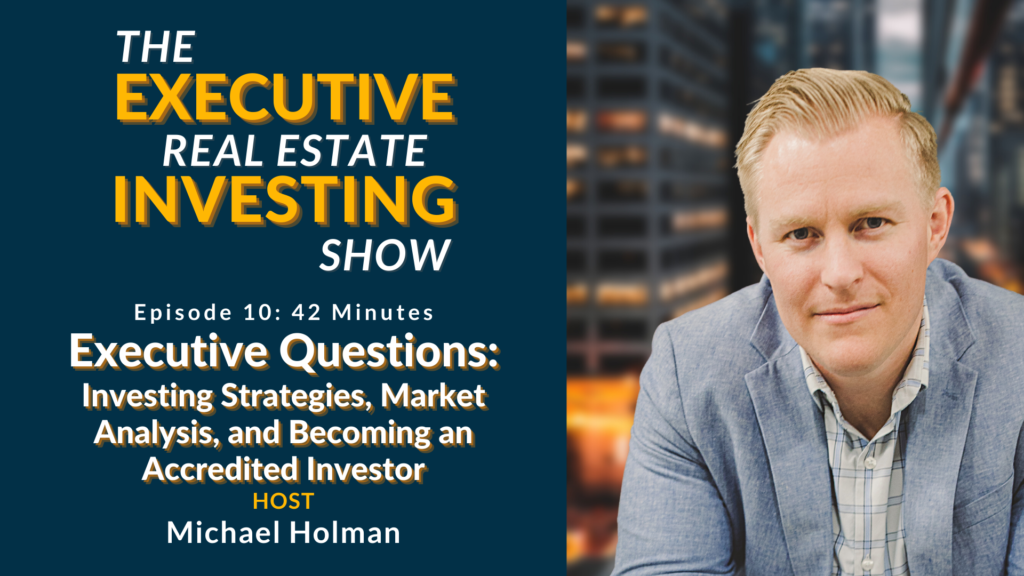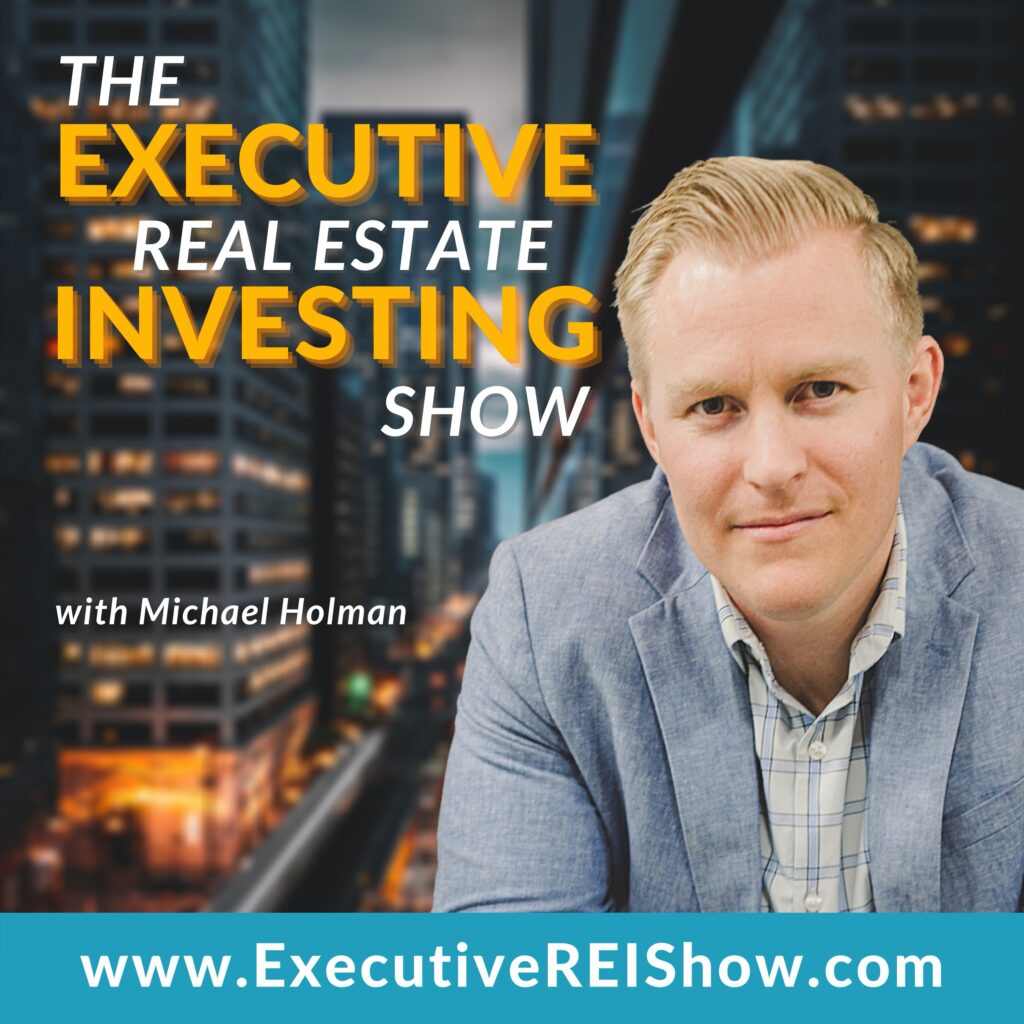
The executive Real estate investing Show
EPISODE 10
Executive Questions: Investing Strategies, Market Analysis, and Becoming an Accredited Investor with Michael Holman
- August 9, 2021
EPISODE SUMMARY
EXECUTIVE TIP
Do Not Be Afraid To Seek Help
Even if you feel like it’s going to make you look like you don’t know what you’re doing, go ahead and seek help when you need it. Most people in the world are willing to give it. If you ask it right, in the right way, and in the right time, almost always, people are willing to help. Do not be afraid to seek help.
LISTEN TO THE PODCAST HERE

The Executive Real Estate Investing Show Podcast
EP 10: Executive Questions: Investing Strategies, Market Analysis, and Becoming an Accredited Investor with Michael Holman
Listen on
READ THE TRANSCRIPT HERE
Note: Audio transcription has been automatically transcribed
Welcome to The Executive Real Estate Investing Show. This podcast is for you, the busy business owner or executive looking to create generational wealth. Here, we’re going to show you how to do that through real estate investing from multi-family to industrial and everything in between. You will become a real estate investing expert, and now, here’s your host, Michael Holman.
Hello, everyone, and welcome to another episode of The Executive Real Estate Investing Show. I am your host, Michael Holman, and I am excited to be here with you today. We have a great episode today. In fact, it is probably my favorite format of episode that we do. It’s another “ask me anything” where you get to submit your comments, your questions, and I provide the very best answers that I possibly can. Honestly, I feel like if we just did this every single week, it might provide more value than anything else that we do. But we absolutely love doing this. We love getting your questions answered, and we love getting inside your head to figure out the things that you want to listen to. This helps us gauge not only this episode, but a lot of times we’ll base entire episodes going forward or series on the questions in the comments that are submitted. So, please keep doing it.
If you do have a question and you’re thinking, Man, I need to ask Mike that question. Go ahead. Go onto our website. It’s ExecutiveREIShow . That’s ExecutiveREIShow.com. Go ahead and click on the button. You can submit a question, and if it’s a good one, we will put it on the show, and we’re going to announce your name. It’s going to be fantastic. So, go ahead and do that. We love getting these.
But like always, we are going to start with today’s executive tip. So, today’s executive tip, do not be afraid to seek help. I’m saying do not be afraid to seek help. This is really coming to light really in my own business and in my own situation. And that’s what kind of made me think of this executive tip. To kind of frame this, let me give you a scenario that is currently existing in my life. For a long time, we only had minor legal expenses. Minor, legal activity that needed an attorney involved, and a lot of times, we’d have one or two attorneys on a project. Well, we’re starting to getting into projects, and we’ve been getting into projects now that require 2, 3, 4, 5, sometimes half a dozen different attorneys all on the project.
And I’m working on one right now that they were finalizing and trying to coordinate between, I think we have four different attorneys with some really complicated transactions on there, and complicated scenarios has been very difficult. One of the things that I’ve done through this process is I’ve developed a really good relationship with one of our capital partners actually, and they are recommending some attorneys for me to use as general counsels. Someone that can really free up my time and give me the ability to just trust them, to play quarterback with all the other attorneys so that we can have a succinct project. It makes lenders. It makes capital partners. It makes my life easier.
So, today’s executive tip, even if you feel like it’s going to make you look potentially like you don’t know what you’re doing, go ahead and seek help when you need it. Most people in the world are willing to give it, and if you ask it right and in the right way and in the right time, almost always people are willing to help. Do not be afraid to seek help.
All right, we’re going to go ahead and just get right into some of these questions. They are a great set of questions. To be honest, and I’ve said this before, one of the reasons I love this episode is this is one of the most raw formats that we do. If you haven’t noticed, here at The Executive REI Show, we don’t script very much. In fact, a lot of the episodes that we record, there is very little written prior to recording the episode. Even when we do interviews, a lot of times, there’s just a couple of questions that sort of frame the entire conversation.
But the thing that I love about the “ask me anything” I sit down, and I basically get these questions placed in front of me by our fantastic producer, Stephanie. She gives me a list, and I just answer them. You are getting true answers from a true real estate investor to help you in your real estate investing life.
So, first question, this question comes from Dave H. Dave H. says, “I know you talk about how you are a developer a lot. Why do you do development over other investing strategies?” Interesting question, Dave, and thanks for asking that. So, just to start off, I do do all investing strategies. Development just happens to be my favorite and where I focus the most time and energy on. If you aren’t familiar with the investing strategies, most of the investing strategies are contained within four categories. I’ll go into these a little bit, just so that people understand, but there’s core, core plus, value add and opportunistic, or I like to just call that development. Yeah, that’s because of the world that I’m in, but most other people are going to call it opportunistic.
So, a core strategy—what core investing is that is when you’re investing in a real estate asset. It’s completely stabilized. It’s ready to go. Think of an apartment complex or a multi-family building that all the leases are in place. All of the rents are at market value. There’s not really any repairs. You were just buying the asset, getting the return, and that’s it. You’re not doing any real significant work. You can think about it, not even just with apartments, an office. If you were to buy a brand new office building that had a brand new 15-year lease on it with a great tenant, that’s a core investment. You don’t need to do anything for that investment. You’re simply buying it.
The large ones are bought by institutional buyers, so insurance companies. It’s a way to diversify and increase cash flow for them. So, cash flow in these aren’t great. Returns aren’t fantastic. I mean, they’re nothing to write home about. A lot of times, on a core asset, you might see returns in single digits. I mean, you’re still beating the stock market. Don’t get me wrong. But you are seeing returns in maybe high single digits, low double digits, cash flow 5 to 7%, something like that. So, core is great. It’s easy. There’s not headaches, but that’s a core strategy.
Core plus, that is it’s where you’re buying an asset that’s just a ratchet down from core. There’s going to be a little bit of work. It might be four or five years old. Maybe the rents aren’t quite market value. Maybe it’s being a little under-managed a little bit. So, something that you can do just to quick tweak to really bring it up to a core asset into a stabilized functioning market value asset. That’s core plus.
[Value add is where you start getting into a lot of equity creation and value add is actually probably where most syndicators such as myself sit. I mean, that’s where they play, and there’s a lot of good reasons for that. Value adds are great. Basically, you’re buying an undervalued asset, and you’re fixing it up, and your trying to get it to market value and to do market rents and hoping to a lot of times sell it off for market value, or maybe you’re going to refinance and keep it value.
Value add is basically a fancy term to say, “Fix and flip.” Most people are understanding on a home’s a fixer-upper. Value add is simply a fixer-upper of a larger real estate investment. Now, maybe you have management that’s doing a very poor job, and the market rents, whether it’s an office or a retail building or an apartment complex are way below where the market should be or where the market currently stands, and so the property isn’t valued as well as it should be.
The other scenario here, it could be that there needs a bunch of repairs done. The building is just a little dilapidated, and it needs some repairs, or it needs some amenities added to really raise the rent. Essentially, the end goal with a value add always is to be able to do something that increases rent and therefore increases value. It’s a great strategy. Lots of good things about it.
Then there’s development. Like I said, most people they’ll call it opportunistic. I call it development. A lot of people lump them together. I personally liked to call this fourth category development. Really what that is, that’s taking a brand new piece of dirt. I guess dirt isn’t really that brand new. So, it’s taking a piece of dirt and building something brand new on it, new construction. Everyone’s seen these, whether it’s an apartment complex, multi-family, office retail, industrial, storage. This is the space that I play in.
To kind of get to the question of why I like development, I really liked development for a few reasons. The first one is there is a high barrier of entry to doing development. In the development world, just running through a typical scenario in development for me, we’ll buy a piece of land or go under contract for a piece of land. We will literally have to spend hundreds of thousands of dollars depending on the size of the project. I mean, a minimum of 50 to a hundred thousand dollars working on the project in architectural fees, engineering fees, non-refundable deposits, traffic studies, feasibility reports, just to see one, if the project works, and two, if the city will even let us build what we want to build.
So, we go under contract a lot of times on this land with no guarantees. Now, we’ve been doing this long enough that we do a lot of things to ensure ourselves as well as you possibly can. But at the end of the day, there are no guarantees, and so, it’s a really high barrier to entry because not a lot of people are capable or want to put up a couple hundred thousand dollars on the chance of doing a development. Like I said, if you know what you’re doing and you’re really experienced like we are, we don’t go into a development unless we have essentially a minimum of a 90% chance of that development happening. We just don’t do that, and we know what to do and who to talk to in order to gain that level of comfort.
But if you’re brand new to development, I’ve seen a lot of people who try and go from value add to development, and some of them do a really great job. A lot of them end up losing their shorts because development’s a different animal. So, that’s one of the high barriers to entry. It’s just the upfront cost.
I mean, you’re putting a lot of money on the table without really any guarantees, any assurances. Whereas if you build a building that’s already existing, the city isn’t coming to you and saying, “Oh, you bought a building that’s already existing, but you need to tear it down because we don’t want it here.” No, they can’t say that. So, there’s none of that risk.
Also, you deal with the construction cost risk. I mean, all over the place. This is something we deal with constantly, especially now and in the recent past, where construction costs have been going up and down like crazy, mostly up. That’s something that we have to deal with.
In the value add project, let’s say you’re buying a $50 million project, and you’re doing a million dollars in renovations. That means essentially 2%, maybe a little bit more, with some closing costs and stuff are variable. Besides that, the main building, the main structure, that’s a set price. You have a contract with a set price.
Well, in development, that’s not the case at all. In development, 100% essentially, 90 to 100% of the entire cost is variable. It’s really important for us to be able to dictate that, and that’s really hard to do if you don’t have a level of expertise. Those are a couple of the high barriers to entry on why I like doing development.
The other reason I like doing development, to be honest, is it generally has higher upside potential. I mean, there’s some value adds that do really great. Generally, if your value adds are doing good, your developments are doing better. So, as long as you’re picking good markets, you’re building good products, and you’re targeting the right people, your upside on development is fantastic.
I mean, I look at some of the things that a lot of these strictly value add sponsors are doing right now just to get returns to an area where it makes sense. I mean, I’m seeing things like 90% leverage loan to value on a project, which is just extraordinarily high. I’m seeing things where people are raising equity capital just to pay it back just so that their returns get inflated. I mean, that’s nothing wrong. I mean, there’s nothing wrong with any of these scenarios. They just start to aggressive, right? In development, we can be a lot less aggressive on our assumptions. I mean, we could get as aggressive as anyone else, but we can be less aggressive on some of our assumption, and we’re still making money. It still makes sense. We can get the same returns with, honestly, a lower level of risk if you’re asking my opinion. You talk to most people, they’re going to say development’s more risky. If you know what you’re doing. and you’re able to have better assumptions throughout the project—I mean, we’ll have 70 to 80%, maybe max, on a new development project. I mean, if it’s one of our hotel deals, it’s like a 60 to 65% loan to value. I mean, we have a lot more room in there if the market or the economy were to go up or down. So, those are the reasons why I like development. A great question. We got to get going on to some of these other questions.
Next question is from L.J. Awesome name. It flows right off the tongue, L.J. L.J. says, “I love your content. Thanks for sharing your knowledge with the world.” Appreciate it, L. “I’ve been stuck in analysis paralysis. How do I choose a market to invest in?”
Good question. In fact, this is such a good question, we did an entire episode on this just a little while back, and I can guarantee we are going to do a lot more shows on this going forward. But the main answer to your question. That really depends on what it is you’re trying to invest in. What kind of real estate do you want to invest in?
For example, when I’m looking at a multi-family development project, the first thing that I do when I’m looking at a market, I’m looking at employment growth. I’m looking at employment mix. So, not only am I looking at our jobs increasing or decreasing or staying this relatively flat. I also want to know what kind of jobs they are because there are certain jobs that are more conducive to apartments. I want to see what kind of jobs those are.
Generally, what I like to see is I like to see a good mix. I don’t want to see all of one type. I don’t want to see all the white-collar workers. I don’t want to say all blue-collar workers. I don’t want to see that 100% of a market, its economy relies on space exploration. I mean, because you think about that. If you go into a market where the entire economy of that market is based on space exploration and something happens in space exploration that makes all of those people lose their jobs. Now you have likely a bunch of tenants who can’t pay rent.
So, I like to see a really good mix of what the employment is, and that varies. Sometimes in tertiary markets, a good mix is different than a good mix in a primary market. If you’re investing in Southern Utah, your mix is going to look different than if you’re investing in downtown Phoenix and that’s okay. I’m not saying that there’s a certain mix that I have to achieve, but that’s what I’m looking at.
The other thing that I’m looking at is rent growth. I mean, rent growth is basically the magic holy number of apartment investing, and not only apartment investing, office investing, retail investing. I mean, if you can get good rent growth in an area that does so much to increase your returns, increase your value. So, rent growth is a holy number of real estate investing. No matter what asset you’re investing in, the higher your rent growth, the more money you’re going to exponentially make.
The other thing that I’m looking at, I’m looking at popular growth. Those are the main things I’m looking at for like a multi-family development. Now, if I’m doing a retail development, which we do a lot of, or even if I’m looking at buying a retail asset, it’s really similar to multi-family for me. But some things like with retail, traffic counts are really, really important. I mean, with some retail, that is basically the main number.
So, that’s generally, what I’m looking at. I’m not going to go into too much of the details because we’re going to have entire episodes on this. But really, if you got analysis process, if you’re a relatively new investor, and you’re just spinning your wheels going from market to market, to market, to market, you’re looking for the holy grail of real estate investing, the perfect market. Well, guess what? The perfect market usually doesn’t exist.
One of the things that I tell people all the time, if they’re brand new in real estate investing, and they’re asking about markets. Markets are really important. They’re so important that if you’re trying to analyze all of them and you’re planning on doing really anything but single-family homes (and even if you are doing single-family), a lot of times, the easiest and the best thing to do is just to go find a person or a group that you trust or that you believe are doing really well and invest where they’re investing.
I mean, it’s usually not that hard to figure out where someone’s investing. If it’s like me, a lot of the syndicators out here or even the institutional companies, you can go on their website, and they’re going to list out their portfolio. They’re going to list the projects they’re working on. You can start to get a sense of where they’re at and where they’re going.
I mean, so that’s just one of the easiest ways. I’m not saying that this is what you do for time and all eternity because the more sophisticated you get, the more understanding you get about markets and real estate investors, the more granular, the more detailed you can get, which helps reduce your risk. And potentially not only that, but find opportunities, but if you’re stuck and you’re just are all over the place, then my suggestion is go find someone. Go find a group, and either invest with them in one of their deals or invest where they’re investing. It does wonders, and it really gets you started.
The important thing with real estate investing oftentimes is getting across that first hurdle and that first real estate investment. After that, it really just starts to flow, and maybe with this, you find someone or a group that you really enjoy working with, and they make you a lot of money, and you’re thinking, I don’t want to do this on my own. I’m just going to put my money with them. I trust them, and they keep making me money. Or maybe you invest where they’re investing, and you buy a single-family home, and it does well, and you can kind of track along with them.
So, there’s a lot of different options, but that is my suggestion. If you’re a relatively new investor and you’re stuck in analysis paralysis, you got to do what you have to, to get out of that mode because the worst thing that you could do when it comes to real estate investing is to sit and do nothing. To have a bank account full of cash that’s earning you 0.0001% at a bank. You are losing the ability to compound that money. So, go invest and do something. It’s really, really important.
A couple more questions as we go throughout here. Next question is from Eric P. Eric says, “If you had $50,000 to invest in real estate right now, how would you invest it?” Good question, Eric, and that one’s an easy question for me.
I mean, first and foremost, I do this all day, every day. So, I would obviously put it with one of my projects, but let’s remove me out of this situation because this is not about self-promotion. So, let’s say I’m Joe Schmoe. I’m not a syndicator. I’m not investing in real estate as a general partner, and I’m not active in it.
If I had $50,000 to invest, knowing what I know right now, I would go find a group who’s probably doing multi-family or industrial real estate, and I would go put my money with them. Different than a lot of paths that people take. A lot of people when they get $50,000, the first thing they go do it because they want to go buy a single-family home. They have this dream of I’m going to buy, sometimes it’s four homes, and I’m going to pay them off. Sometimes I’m going to buy a hundred homes, but it always seems to start with homes, which is fine. That’s a great way to start, and I’m not knocking that strategy at all. I mean, Blackstone just raised, I think, a $3 billion fund to go invest in single-family homes. So, they obviously think that single-family homes are going to do well over the next little bit. So, I’m not opposed to that.
Just knowing what I know now, putting that in a syndication, there is so much economies of scale that come from putting your $50,000 with 200 other people’s $50,000 and being able to go buy an asset that no one individual, none of you individually, could go buy. So, that’s what I’m looking at.
I mean, and the way that you look at syndications, I mean, really one of the benchmarks for a lot of syndications is getting a 20% annualized return. I look at it, and I say, “If I could put $50,000 with a good syndication, someone who has a good track record, someone who I’ve talked to and I’ve asked difficult questions to. They’ve given me acceptable answers, and there’s a level of trust there.
I put it with them on a project where they expect a 20% annualized return. That means in five years I’m doubling my money, especially if you’re starting off young, which a lot of people start investing in real estate in their thirties, forties, which is good. If you had $50,000 and you did nothing, you didn’t add to that at all. You had $50,000, and you double it every five years; you just put it with this indication. You get a 20% annualized return. Usually, they’re going to sell in about five years. You’ll put it with another one, 20% return. They sell it in five years.
If you were to do that and double your money every five years, in 25 years, that $50,000 is worth $1.6 million, and you didn’t have to do anything else. You just had the $50,000, and you just rolled it from investment to investment, to investment. Now, some are going to be better than that. Some will probably be worse than that. But that’s what I would do.
I mean, talk about a retirement program, right? I mean, everyone’s talking about retiring, and everyone’s going crazy with the stock market right now. “Oh, yeah, you know, I got a 10% return this year.” I mean, this is unheard of. We’re stuck at the 99th percentile of stock prices and have been there for months. I mean, it’s going to go down. It always does. I mean, that’s just the economy that we live in, but if you could consistently get a 20% return, people don’t understand how much that really makes a difference over time.
Like I said, $50,000 doubling every five years, 25 years, it’s $1.6 million. Depending on your circumstances and what you want in life, that could be enough for you to retire. If you are 40 and you’re just getting started investing in real estate, just think about that. Think if you added some more $50,000 investments along the way. I mean, you could be sitting there in 25, 30 years when you’re getting ready to retire three, four, $5 million just off of making a few good real estate investments.
So, that’s what I would do. Like I said, and that’s removing myself out of the situation. I’m a syndicator, yes, and I’m a firm believer in it. I absolutely think it’s the way to go if you’re trying to get invested in real estate and diversify across sponsors and diversify across assets and classifications. I think it’s great. But I’m telling you, that’s what I would do.
I put my money with other syndicators as well. I invest in all my own projects. Don’t get me wrong. That’s my first and foremost priority. But with some extra cash that I have, I like to invest with other syndicators. That is, in my opinion, the very best way to get started. If you were having that much, if you had 50,000, that’s how I would do it.
I’m going to go ahead and answer a question you didn’t ask. What if I have less than $50,000? What do I do? Well, if you have less than $50,000, that’s fine. But the main goal, $50,000, is oftentimes a minimum requirement to get into syndications.
If I had less than $50,000, I would do everything I can to get to $50,000 as quickly as possible, whether that’s your 401k because you can invest through a self-directed IRA, and we’ll get into that later. But whether it’s through a 401k, whether it’s through the stock market even because you can do that, whether it’s saving. Whatever you got to do trying to get to that mark, I would be working very, very hard saving and making whatever good investments I can to try and get to that $50,000 mark.
All right, next question. It comes from Shane W. Shane says, “I’ve been looking at investing through a syndication, and most of them talk about a preferred return. What is that?” Shane, good question, and you are going to see this. I mean, if you’re looking at investing in real estate syndications, you’re going to see preferred return pop up most of the time. So, a preferred return is simply an incentive mechanism to ensure that the limited partners, the investors on a project, get paid first.
Essentially, what it says is, let’s say you invested a million dollars with X, Y, Z syndicator, and they had an 8% preferred return. Well, what that means is that sponsor whoever’s putting that deal together is not going to get paid anything until you’ve received an 8% return on your money. Generally, that’s annualized. I’ve never seen one that isn’t annualized, but just to clarify. So, if you invested a million dollars, that’s sponsor doesn’t get anything until you’ve received the equivalent of $80,000 a year. Now, the way that gets paid out is different with some people. In the development world that I’m in, that preferred return often accrues.
If I’m doing a development project and I’m under construction for two years, I don’t have the ability to pay preferred returns during that time, or if I’m in lease-up, I can’t pay a preferred return during the lease-up. That would make no sense to take the cash that I have to ensure that I get to stabilization and pay it out. So, it accumulates.
Somebody might have their money with us for two years at a million dollars. They have it with us for two years before we can start paying distributions. Well, they’ve accumulated $160,000 worth of preferred returns. That means that they have to get paid $160,000 before the sponsor gets anything. So, that’s all preferred return. They generally range anywhere between six and 10%.
I’ve heard some people argue that a higher preferred returns better. I’ve heard some people argued that a lower preferred return is better. It varies. Personally, I think as long as there is a preferred return, that’s the important thing, and I generally think 8% is oftentimes kind of right middle of the fairway, is an 8% preferred return. I think what it does is it just provides some assurance to the investors, but it also incentivizes the sponsor as well. That’s all a preferred return is. I’m sure we’ll get into that more at a later show as well.
Okay. This is our very last question. So, last question comes from Kenna J. Kenna says, “I keep seeing the term accredited investor pop up. What is an accredited investor, and how do I become one?” Fantastic question, Kenna? This comes up all the time, especially if you’re new to real estate investing or you’re investing in something outside of the stock market. You oftentimes see this in private equity and private equity real estate like we’re in, syndications. Accredited investor is a really important term.
Oftentimes, I talk to people, and they’re like, “Okay, what tests do I need to pass?” There’s no like written test or anything. What it takes to be an accredited investor, there’s two main rules, and then they recently expanded that last year a little bit, and I’ll get into that. The two main rules are basically to say, one, if you make over $200,000 a year for the last two years, or with your spouse together, the two of you have made over $300,000 in the last two years, and you expect to make that in the foreseeable future, you’re an accredited investor.
That’s the income test, or number two is the net worth test. Basically, it says if you have a million dollars of net worth excluding your primary residence, you’re considered an accredited investor. I didn’t come up with these rules. SCC came up with these rules, and I struggle with the rules a little bit in the fact that I feel like the people who could benefit the most from the types of investments that they’re being—are the people who could benefit the most from investing in these type of investments are often restricted.
But what the SCC is saying, we don’t want anyone getting taken advantage of. Therefore, you have to ensure that if this person has this much net worth or is making this much money, they can afford to lose it in a worst-case scenario. What they don’t want is they don’t want some slime ball coming through, and trying to attract grandma and grandpa, taking their life savings and putting it in terrible investments when grandma and grandpa $300,000 that they’re trying to retire on and live off of. And some sleazy investment salesman comes by, gobbles up all their money, wastes it all, and now grandma and grandpa’s left on the street. Right? So, the SCC is trying to avoid that, and I get that.
The good news is the SCC also understands that these two tests, these two requirements, aren’t perfect. And it’s one or the other. The good news is that they’ve been recently expanding this, and we’ll link to the actual SCC documentation in our show notes. If you want to go read the actual SCC statement, go to the show notes, you can see it there, but they’ve been increasing a little bit.
They expanded the definition of a credit investor a little bit. They’ve included some additional entities. They’ve clarified some of the net worth and income test questions, such as, “If me and my spouse together have over a million dollars of net worth excluding our primary residence, do we count?” They clarified some of those questions.
The other thing they did is they started allowing you to be considered an accredited investor if you have certain licenses. So, specifically, investment sales licenses, series 63, series 7. If you have those licenses, you are deemed to have enough knowledge to be able to take on the risk that something like a real estate syndication investment presents. Now, I’m a little bit offended. I’m a CPA by trade. That was my formal life. I was an auditor. So, I must say, I am a little bit offended that the CPA designation didn’t get included in there, but that’s okay. They are working on more rounds of potential expansion to that definition. I know CPA has been a topic of conversation along with attorneys and some of these other designations.
So, that’s what an accredited investor is. Like I said, most people even nowadays still go by the two rules, but it did get expanded a little bit last September, and it’s really important. I mean, you want to be an accredited investor. If you’re not an accredited investor, it needs to be one of your main goals to become an accredited investor as quickly as possible. Because the funny thing is, is once you get to the point that you’re an accredited investor, a myriad of investment opportunities just opened up to you.
Oftentimes, you can find a real estate syndication, for example, if you’re non-accredited, but the problem is, the sponsors of those deals aren’t allowed to go generally solicit you. They can’t go try and show you the deal. You basically already have to have a relationship with them. So, it takes a lot more effort on the non-accredited investor because they have to go find the sponsors who were doing those kinds of deals, and then they’re allowed to invest after they’ve established a relationship. It just takes a lot more effort.
Whereas if you’re an accredited investor, you can see hundreds of deals in a matter of seconds. Just doing a Google search, you’ll come up with hundreds of potential investments. Some could be really, really good. So, that’s an accredited investor.
That is the end of the “ask me anything” today. Love it! Love it, love it, love it. Continue to ask your questions. Like I said, if you have a question you want answered on this show live, raw, unfiltered, go to ExecutiveREIShow.com and submit your question. We love hearing from you. We love it when you get involved in the community, and we will be there to be a resource for you so that you can continue to create generational wealth.
Make sure you go on, like I said, go to ExecutiveREIShow.com. Check out the past episodes. Check out the resources. There’s blogs. You can ask questions. Go there. It’s going to be great. If you haven’t already, if you’ve been listening to the show for a while, or this is your first show, and you like what you hear. Please, please, please go to Apple Podcasts or Spotify or wherever you listen to podcasts. Leave us a review. Leave us a rating. We want to hear from you. We want to see your comments. We are excited about the journey you’re taking. Keep on going, and we’ll see you next time.
Thank you for listening to The Executive Real Estate Investing Show. Ready to learn more? Go to ExecutiveREIShow.com for more episodes and resources to help you create generational wealth through real estate investing. That’s ExecutiveREIShow.com.







